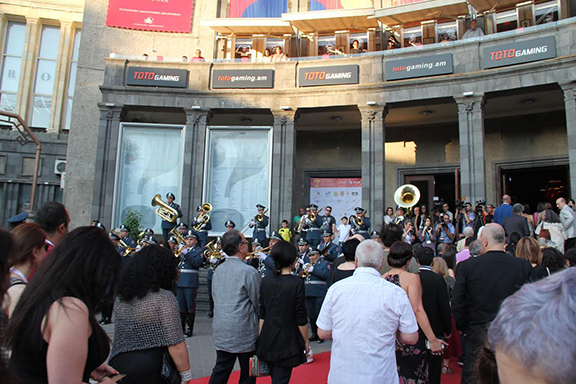
A scene from the opening ceremonies of the 2015 Golden Apricot International Film Festival (Photo by Armen T. Marsoobian)
BY ARMEN T. MARSOOBIAN
The 12th annual Golden Apricot International Film Festival concluded last month in Yerevan. With commemorations of the centennial of the Armenian Genocide taking place this year, it is understandable that one of the themes of the festival would be the Genocide and its consequences.
In the documentary category there were many films, both new and old, exploring the theme. Two films stand out amongst those I was able to view, Blood Brothers and Morgenthau. In the feature film category, I saw two quite different films dealing with the long-term consequences of the last century’s violence in Anatolia. 1915 directly takes up the trauma of the Genocide within individuals living in the diasporan community of contemporary Los Angeles, while Snow Pirates, subtlety echoes the continuing violence within a Turkey devoid of its former Armenian inhabitants. Snow Pirates sets its drama in Kars in the winter of 1981, the year following the violent and repressive military coup of the year before.
Blood Brothers (original Dutch title, Bloedbroeders), unlike more conventional film documentaries that combine historical footage with interviews with experts and witnesses, is crafted around two protagonists whose interactions and inner thoughts create a dramatic tension that engrosses the audience till the film’s final climactic scene. The more conventional Morgenthau examines the lives and activities of three generations of the Morgenthau family beginning with Henry Morgenthau, Sr. whose diplomatic efforts opposing the genocide and his subsequent leadership in the relief efforts for its victims are well known, at least among the Armenian community. Both films are excellent within their very different approaches to documentary making.
Morgenthau, produced and directed by Max Lewkowicz, succeeds in capturing the high moral standards and commitment to public service exemplified by Henry Morgenthau, Sr., the U.S. ambassador to the Ottoman Empire, 1915-1917, his son Henry Morgenthau, Jr., the Secretary of the Treasury under President Roosevelt, and his grandson, Robert Morgenthau, U.S. Attorney for the Eastern District and long-serving District Attorney for Manhattan. While Henry Sr. was a champion of the Armenian cause, his son was a champion of the underclass who suffered the most during the Great Depression. Henry Jr. was the chief “doer and maker”